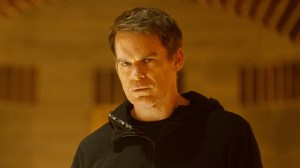Christopher Nolan’s eagerly anticipated and massive film Oppenheimer is now in theaters, bringing the story of J. Robert Oppenheimer and the development of the first atomic bomb to the big screen. A biopic more about Oppenheimer — played in the film by Cillian Murphy — than the bomb itself, the film is presented in a nonlinear format that shows not only his early years and his time leading the Manhattan Project, but his years following as well as the impact his personal and political life had, particularly as Oppenheimer came to understand what had been unleashed on the world following the Trinity test.
Videos by ComicBook.com
Key to all of this is an interaction between Oppenheimer and Albert Einstein (Tom Conti) in 1947 that is seen a few times in the film, but that has particular importance at the very end of the movie when we find out the true scope of the moment. And it’s a moment that is leaving audiences with a lot to consider.
Warning: spoilers for Oppenheimer beyond this point.
At various points in Oppenheimer, we’re shown bits of Oppenheimer briefly meeting with Einstein in 1947 when Oppenheimer is offered a job at the head of the Institute for Advanced Study at Princeton by Lewis Strauss (Robert Downey Jr). For most of the film, the only glimpses of this meeting that we see are from outside perspective — specifically Strauss’ who sees it only from a distance and doesn’t actually hear the conversation between the two scientists and, thus, assumes it is about him. That assumption is something Strauss puts on a list of grievances he has against Oppenheimer and eventually fuels his efforts to take down Oppenheimer’s reputation.
However, at the end of the film, the viewer is finally shown what the true nature of that conversation was about. One of the things that is established in the film is that most of the “younger” generation of physicists — meaning Oppenheimer and his group — see Einstein as someone who brought forth the idea of quantum physics but never embraced it; Einstein is presented as being part of the past. However, the conversation with Oppenheimer reveals that what is actually the case is that Einstein understands very well what his work kicked off and the consequences of that— and makes it clear to Oppenheimer that he is now the “old” scientist who must deal with what he’s brought forth, too.
“You all thought that I’d lost the ability to understand what I’d started,” Einstein tells Oppenheimer and then adds, “Now, it’s your turn to deal with the consequences of your own achievement.”
Einstein also passes on some additional hard truths, telling Oppenheimer that the scientific establishment will come to praise him and give him awards and celebrations and forgive him and treat him well, but that ultimately those accolades won’t be for him, but for them instead, an absolution of sorts — and indeed, the audience is given a bit of a flash forward to Oppenheimer’s life and we see exactly that.
But perhaps the most chilling aspect of the interaction isn’t what Einstein tells Oppenheimer, but what Oppenheimer tells Einstein. As Einstein is leaving, Oppenheimer reminds the other scientist of a moment from the early days of the Manhattan Project when Oppenheimer was concerned about calculations that if they set off the atomic bomb, they could create a chain reaction that would never end and ignite the atmosphere, thus destroying the world. When Einstein asks Oppenheimer “what of it?”, Oppenheimer responds, “I believe we did” before the film closes in on Oppenheimer’s face and then cuts to an ever-growing array of modern nuclear missiles and images of nuclear blasts pulled from Oppenheimer’s catastrophic visions.
The meaning of Oppenheimer’s words “I believe we did,” is not literal, but clear. While the Trinity test and, indeed, the atomic bombs that followed did not create an uncontrollable chain reaction that ignited the atmosphere and destroyed the world in an instant, they did set off another sort of chain reaction, one in which world governments continue to create and develop more and more powerful thermonuclear devices with ever-growing and horrifying capabilities to destroy life and the world. The catastrophic chain reaction did indeed happen — just perhaps not the way he originally feared it would.
“It is an intense experience, because it’s an intense story. I showed it to a filmmaker recently who said it’s kind of a horror movie. I don’t disagree,” Nolan told Wired magazine. “It’s interesting that you used the word nihilism earlier, because I don’t think I’d quite managed to put my finger on it. But as I started to finish the film, I started to feel this color that’s not in my other films, just darkness. It’s there. The film fights against that.”
Joining Oppenheimer lead Cillian Murphy are Emily Blunt as Katherine “Kitty” Oppenheimer, Matt Damon as Leslie Groves, Robert Downey Jr. as Lewis Strauss, Florence Pugh as Jean Tatlock, Benny Safdie as Edward Teller, Michael Angarano as Robert Serber, Josh Hartnett as Ernest Lawrence, Dylan Arnold as Frank Oppenheimer, David Krumholtz as Isidor Isaac Rabi, Matthew Modine as Vannevar Bush, Josh Peck as Kenneth Bainbridge, Devon Bostick as Seth Neddermeyer, Matthias Schweighöfer as Werner Heisenberg, Christopher Denham as Klaus Fuchs, Guy Burnet as George Eltenton, Danny Deferrari as Enrico Fermi, Emma Dumont as Jackie Oppenheimer, Gustaf Skarsgård as Hans Bethe, Trond Fausa Aurvåg as George Kistiakowsky, and Gary Oldman as Harry S. Truman.
Oppenheimer is based on Kai Bird and Martin J. Sherwin’s Pulitzer Prize-winning novel American Prometheus: The Triumph and Tragedy of J. Robert Oppenheimer. The film is in theaters now.








